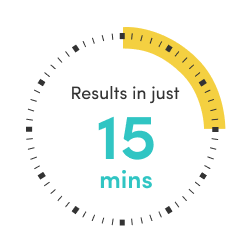Testosterone Testing: The Foundation for Hormonal Well-Being

Did you know? Testosterone influences more than just physical strength—it impacts thinking ability, mood, and memory. Men with low testosterone levels may experience depression, fatigue, and general irritability. Monitoring your testosterone levels is vital for overall well-being.
Your Health, Your Strength—Stay in Control
Schedule Your Testosterone Test Today!Book Your Test Now at only £59.00

Why Should You Take theTestosterone Test?
Testosterone hormone is essential for physical development, reproductive health and well being of both males and females. Regular testosterone testing identifies underlying health issues, supports hormone therapy and helps you maintain healthy hormonal balance. And here's why this test is important:
Diagnose Hormonal Imbalances:
Identify symptoms of low or high testosterone: fatigue, mood changes, reduced muscle mass or abnormal hair growth.
Monitoring Puberty in Children and Teens:
Find out why early or delayed puberty occurs so that medical intervention can be directed and healthy growth and development can be achieved.
Track Hormone Therapy:
Monitor testosterone levels if you are receiving gender-affirming hormone therapy or other medical treatments that affect hormone levels.
Manage Chronic Conditions:
Test your testosterone levels if you've had unusual results previously or are on a medication that affects hormone production.

Symptoms Indicating theNeed for Testosterone Testing
Imbalances in testosterone may appear differently in males and females. The top symptoms that warrant testing are:
Low Sex Drive (Males)
A decrease in sexual interest or activity may indicate low testosterone levels affecting quality of life.
Erectile Dysfunction (Males)
Low testosterone or other underlying health conditions may cause difficulty achieving or maintaining an erection.
Infertility (Males)
Low testosterone may lower sperm production.
Loss of Muscle Mass in Males
Reduced strength and muscle size are common signs of low testosterone - especially during old age or health conditions.
Excessive Hair Growth (Females)
Facial or body hair growth that is unusual or hirsutism may indicate elevated testosterone levels - linked to conditions such as PCOS.
Hair Loss (Both)
Thinning hair around the temples and crown may indicate a testosterone imbalance.
Irregular/Absent Menstrual Periods (Females)
Unbalanced hormones like high testosterone may disrupt menstrual cycles and fertility.
How and What We Measure
A testosterone test measures how much testosterone your blood has. This hormone, predominantly associated with male characteristics, is also present in females in smaller quantities. The test typically involves drawing a blood sample from a vein in your arm, usually between 7 a.m. and 10 a.m. when testosterone levels are highest.
Testosterone is the key to developing male muscle mass, bone density and body hair. In females it contributes to ovarian function, bone strength and libido. Abnormal testosterone levels may cause hormonal disorders, infertility and other physical changes.
- 1
Levels of hormones vary during the day. The test is accurate only if it is done between 7 a.m. and 10 a.m. when the levels are at their peak.
- 2
- 3
- 4
- 5
- 6
Stay Strong with KP Pharma’sTestosterone Testing

Understanding Your TestosteroneTest Results
| Male Age Range | Testosterone Level (nmol/L) | Testosterone Level (ng/mL) | What It Means for Your Health |
18 to 29 | Less than 8.7 nmol/L | Less than 2.5 ng/mL | Low Levels:Indicates testosterone deficiency, which may cause fatigue, low libido, and muscle weakness. Consult a healthcare provider for further evaluation. Retest in 3-6 months or as advised. |
30 to 49 | Less than 10.4 nmol/L | Less than 3 ng/mL | |
50+ | Less than 6.9 nmol/L | Less than 2 ng/mL | |
18 to 29 | 8.7 to 24.3 nmol/L | 2.5 to 7 ng/mL | Normal Levels:Indicates healthy testosterone levels for age and gender. Maintain a balanced lifestyle and retest annually. |
30 to 49 | 10.4 to 27.8 nmol/L | 3 to 8 ng/mL | |
50+ | 6.9 to 26 nmol/L | 2 to 6.5 ng/mL | |
18 to 29 | More than 24.3 nmol/L | More than 7 ng/mL | High Levels:Indicates elevated testosterone levels, which may be linked to health issues. Seek medical evaluation for appropriate management. Retest in 3-6 months or as advised. |
30 to 49 | More than 27.8 nmol/L | More than 8 ng/mL | |
50+ | More than 22.6 nmol/L | More than 6.5 ng/mL | |
Female Age Range | Testosterone Level (nmol/L) | Testosterone Level (ng/mL) | What It Means for Your Health |
18 to 29 | Less than 0.7 nmol/L | Less than 0.2 ng/mL | Low Levels:Indicates testosterone deficiency, which may cause fatigue, low libido, and muscle weakness. Consult a healthcare provider for further evaluation. Retest in 3–6 months or as advised. |
30 to 49 | Less than 0.7 nmol/L | Less than 0.2 ng/mL | |
50+ | Less than 0.3 nmol/L | Less than 0.1 ng/mL | |
18 to 29 | 0.7 to 2.4 nmol/L | 0.2 to 0.7 ng/mL | Normal Levels:Indicates healthy testosterone levels for age and gender. Maintain a balanced lifestyle and retest annually. |
30 to 49 | 0.7 to 2.6 nmol/L | 0.2 to 0.6 ng/mL | |
50+ | 0.3 to 1.7 nmol/L | 0.1 to 0.5 ng/mL | |
18 to 29 | More than 2.4 nmol/L | More than 0.7 ng/mL | High Levels:Indicates elevated testosterone levels, which may be linked to health issues. Seek medical evaluation for appropriate management. Retest in 3–6 months or as advised. |
30 to 49 | More than 2.1 nmol/L | More than 0.6 ng/mL | |
50+ | More than 1.7 nmol/L | More than 0.5 ng/mL |
